What’s driving the protests against Israel’s judicial reform: From feminism to defending democracy
EL PAÍS speaks to four protesters about why they are fighting back against Netanyahu’s plan to weaken the Supreme Court
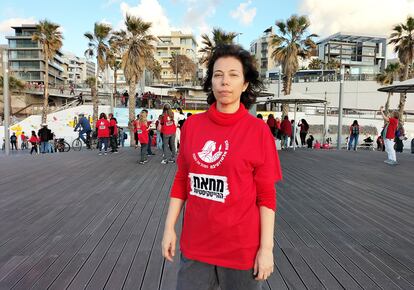
Ayelet, Damian, Warda, Tamar and Or are united by two things – their Israeli passport and their participation in the mass protests that have swept across the country in response to the government’s judicial reform plan. The four, however, have very different reasons for protesting the measure tabled by the Benjamin Netanyahu administration, which is the most right-wing in Israel’s history. These reasons stem from their own fears, be it that Israel will turn into a dictatorship or that women and the Arab minority in the country will lose their rights under the reform. There is, however, one fear that they all share: that they will no longer be able to freely express their views, as they have for this EL PAÍS report.
The government’s judicial reform plans – which has brought tens of thousands of people to the streets every Saturday for the past 10 weeks – seeks to weaken the Supreme Court, allow Parliament to overthrow some of its decisions and to give the government more power over judicial appointments. The government has defended the reform as a bid to give more power to democratically elected institutions against a Supreme Court that they consider politicized and interventionist. But opponents of the measure consider it an unacceptable attack on the division of powers. Last Thursday, the president of Israel, Isaac Herzog, asked the government to withdraw the reform for endangering “the democratic foundations of the State of Israel.”
While the protests have been sparked by the judicial reform plans, they have become a broader call for action from the most secular and liberal Jewish population.
Ayelet Rishpon, 46. “I fear that women will stop mattering”
Ayelet Rishpón’s T-shirt reads: “We are building an alternative.” It’s red to show that the Israeli government must not cross the red line over women’s rights. Hundreds of people were wearing the shirt as part of a human chain in Tel Aviv on Wednesday, March 8, in honor of International Women’s Day. At the protest – organized to oppose the government’s judicial reform plans – demonstrators chanted slogans such as “Israel is no Iran,” “Democracy” and “This is not Poland.”
Rishpon, a doctor by trade, fears that Netanyahu’s government will end up forging a country “in which women don’t matter.” She points out that the ultra-Orthodox Jewish parties that make up Israel’s coalition government only admit men on their electoral lists. In the current government, the number of female ministers has fallen to six (19%) and none has a significant portfolio.
She highlights how the bus lines segregated by sex – where men sit in the front and women in the back – through religious neighborhoods has expanded under Netanyahu. “It is not only the reform, it is all very connected. In a democracy, winning the elections does not mean being able to annul it. Sixty-four deputies [the number the government coalition has in the Knesset, the Israeli Parliament, with 120 seats] are not a reason to violate the rights of minorities like us,” says Rishpón.
When reminded that women are not a minority, but half the population, she replies: “Yes, but they treat us like a minority.”
Damian Yoffe, 52: “I don’t want to ask myself later why I didn’t do anything”
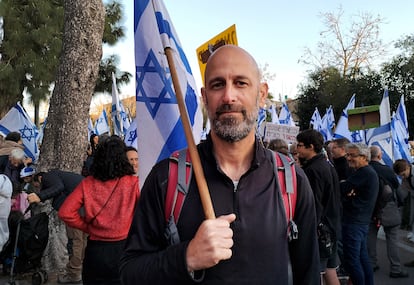
Damian Yoffe proudly carried his country’s flag last Thursday during a protest outside the home of Economy Minister Nir Barkat in Jerusalem. “I want to have an influence, but without violence and without doing anything illegal,” he stresses. He is also a volunteer reservist in the army (he has passed the mandatory age for service) and disagrees with the hundreds of reservists who are refusing – as part of the protests – to train or carry out certain tasks. “I don’t think it’s valid to bring in the army. There is a consensus around leaving the army out of these things, among other reasons, because it could go in the other [ideological] direction. What then? It is the only place where we all come together,” he argues. “Besides,” he adds, “I don’t think we’re at that stage yet. It is a tool that can be saved for later.”
Yoffe defines himself as “from the center” (“I’m not from the left,” he clarifies) and has driven more than an hour from Pardes Hanna-Karkur, near the Mediterranean coast, to join the demonstration. “I didn’t go out to protest the cost of living [in 2022], or the [2011] cottage cheese boycott [against rising food prices]. But I want a democratic country, and I don’t want to sit at home and then wonder why I didn’t do anything. Because this is something that can change.”
Warda Sada: “For Arabs, it is an opportunity to make our voices heard”
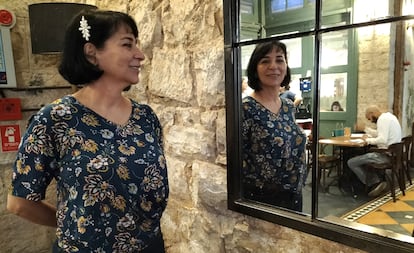
Warda Sada is Palestinian and that, in Israel, means a lot. She belongs to the 20% of the country’s Arab citizens, who, for the most part, have not taken part in the protests. Although the judicial reform also affects them – as the Supreme Court has protected them in the past from discriminatory initiatives –, the Arab community does not see it as their fight. In general, they see the massive marches of the past few weeks as one of those big parties to which they neither feel invited nor interested in attending. The Arab community points out that there were hardly any protests when the Knesset withdrew the co-official status of the Arab language and enshrined Israel as the “nation-state of the Jewish people” – a measure approved by the Supreme Court two years ago.
Sada, however has been taking part in the protests. “We Arabs cannot ignore what is happening,” she says from a Jerusalem café over a sahlab, a hot drink popular in the Middle East. “It is an opportunity for us to have a voice in a place where we are needed, something that is not always possible. There is already a double standard within Israeli democracy [rules for Jews and Arabs], which only lets one voice be heard.”
Sada was born in Kafr Yasif, an Arab-Israeli city with a communist tradition very close to the border with Lebanon, but now lives in Beit Yala, a town in the West Bank. For this reason, she says, she has demonstrated against the reform in Tel Aviv, Jerusalem and Haifa.
Another of her objectives is to warn her Jewish compatriots. “Everything that happens to us, will end up happening to you. When people shut up, bad things spread, like the coronavirus,” she says. “I defend the Supreme Court because I also want to use this as an opportunity to talk about its problems. Because what’s the alternative? For it to disappear? Is that going to be better?”
Tamar Verete-Zehavi, 63. “Israel is only democratic for Jews. I am afraid that it will be less and less so”
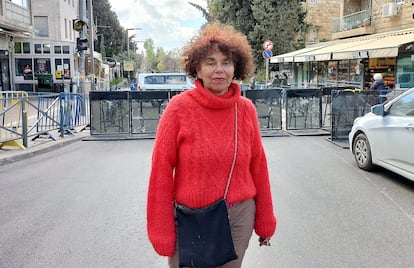
Tamar Verete-Zehavi, 63, reads one of her poems about what she calls the “apartheid wall” – the barrier erected by Israel in the occupied West Bank. A few dozen people listen to her as she speaks from on a well-known sidewalk café in Rehavia, a Jerusalem neighborhood filled with German Jews who fled Nazism and today symbolizes the Ashkenazi intellectual elite. The event, held last Thursday, was organized to mark the“Day of Resistance against the Dictatorship.”
Verete-Zehavi does not mention the judicial reform when explaining why she is participating in the protest. “Israel is only a democratic state for Jews. What scares me is that it will be less and less democratic, that we won’t be able to openly oppose the occupation,” she says.
A teacher trainer, Verete-Zehavi has written some 20 children’s and young adult books (several of which were written in Hebrew and Arabic) supporting peaceful coexistence. It’s a position that few youngsters share: 70% of Israeli Jews between the ages of 18 and 24 define themselves as right-wing, while fewer and fewer see peaceful coexistence as a possibility.
Or Zadiq, 25: “The Supreme Court protects minorities, including the ultra-Orthodox”
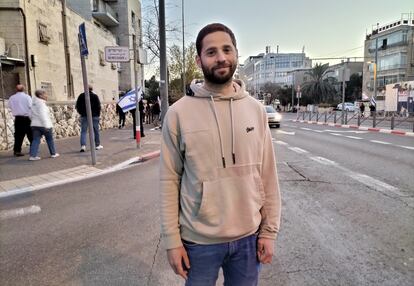
Or Zadiq belongs to the Jewish majority, but every few sentences he brings up his fear that this government will harm the country’s minorities. “I’m studying social work, what can I do?” he says with a laugh.
When asked why he is protesting the judicial reform plans, he explains: “It is not only because of the issue of justice, it is also because of the radical nature of this government.” Zadiq says the separation of powers in a democracy is of “great importance” and sees the Supreme Court as “a protector of minorities,” including ultra-Orthodox Jews.
Zadiq fears that his country will become more religious and restrictive: “Just as there is no public transport on sabbat anymore, I am afraid that my girlfriend will end up getting pushed to the margins, or that in academia, you will no longer be able to say what you want.”
Sign up for our weekly newsletter to get more English-language news coverage from EL PAÍS USA Edition
Tu suscripción se está usando en otro dispositivo
¿Quieres añadir otro usuario a tu suscripción?
Si continúas leyendo en este dispositivo, no se podrá leer en el otro.
FlechaTu suscripción se está usando en otro dispositivo y solo puedes acceder a EL PAÍS desde un dispositivo a la vez.
Si quieres compartir tu cuenta, cambia tu suscripción a la modalidad Premium, así podrás añadir otro usuario. Cada uno accederá con su propia cuenta de email, lo que os permitirá personalizar vuestra experiencia en EL PAÍS.
¿Tienes una suscripción de empresa? Accede aquí para contratar más cuentas.
En el caso de no saber quién está usando tu cuenta, te recomendamos cambiar tu contraseña aquí.
Si decides continuar compartiendo tu cuenta, este mensaje se mostrará en tu dispositivo y en el de la otra persona que está usando tu cuenta de forma indefinida, afectando a tu experiencia de lectura. Puedes consultar aquí los términos y condiciones de la suscripción digital.









































